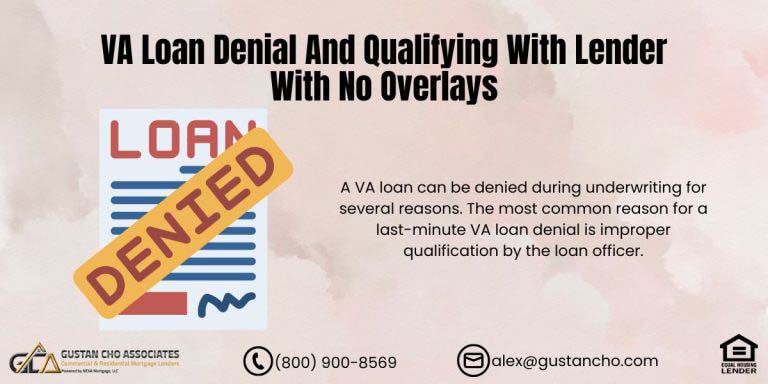Mortgage With Short Employment History: Your Guide to Getting Approved
If you think having a short employment history will stop you from getting a mortgage, think again. Many prospective homebuyers might be astonished to discover they are still eligible for a home loan, even if they do not possess a conventional two-year employment record.
Whether you’re a recent graduate, someone re-entering the workforce, or starting a new job, there are ways to show lenders you’re a reliable borrower. At Gustan Cho Associates, we specialize in helping borrowers navigate challenges like these and secure the financing they need.
In this guide, we’ll explain the options, requirements, and strategies for getting a mortgage with short employment history so you can take the next steps toward homeownership.
Do You Need Two Years of Employment History for a Mortgage?
When applying for a mortgage with short employment history, remember that most lenders want to see a two-year work history. However, this doesn’t mean you must stay at the same job for two years. Lenders are more interested in your work patterns overall, not just your last two years.
So, if you’ve switched jobs, had some time off, or just recently started a new position, you can still qualify for a mortgage. Don’t worry too much about your job changes; it’s all about your entire work journey!
Here’s what lenders typically want to see:
- Consistent income: Lenders care more about income stability than the number of jobs you’ve had.
- Ability to repay: Lenders want to know that your income is reliable and ongoing.
- Gaps explained: If you’ve had employment gaps, be prepared to explain them with a letter of explanation.
At Gustan Cho Associates, we help people who may not fit the usual lending rules. We know that life can throw surprises your way, and our team is here to help you. If you’re looking for a mortgage with short employment history, don’t worry—we’re dedicated to finding solutions that work for you.
Exceptions to the Two-Year Rule
If you don’t meet the standard two-year employment requirement, don’t worry. Many borrowers qualify under exceptions or alternative guidelines. Let’s look at some common situations:
1. Recent Graduates
If you recently graduated and started your career, lenders may count your time in school as part of your work history. For example:
- If you completed a four-year degree and have been working in your field for six months, your education can act as your two-year history.
- You must provide transcripts and proof of employment, such as pay stubs and an offer letter.
2. Re-entering the Workforce
If you’ve been out of the workforce to raise a family, go back to school, or address medical issues, you can still qualify. Here’s what you’ll need:
- A steady job for at least 30 days.
- Documentation explaining the gap (a letter of explanation).
- Evidence that your current income is sufficient, reliable, and ongoing.
3. Job Changes
Frequent job changes don’t necessarily disqualify you. If you’ve switched jobs a lot, it might not be a big deal to get a mortgage with short employment history. Lenders often look at how steady your income has been. If you’ve been making the same amount or even earning more, that’s a plus. If you’ve moved up in your career or found a better-paying job, that can also help your chances.
Get a Mortgage With a Recent New Job
Apply Online And Get recommendations From Loan Experts
Understanding Employment Gaps
Life happens, and employment gaps are more common than you might think. Whether you took time off to care for a loved one, recover from an illness, or pivot your career, lenders are open to reviewing your unique situation. Here are some key points to remember:
Short Employment Gaps (Less Than Six Months)
- You’ll generally qualify if you’ve been back at work for at least 30 days.
- Provide pay stubs and a letter explaining the gap.
Long Employment Gaps (More Than Six Months)
- Before approving a mortgage, lenders typically want to see six months of steady income at your new job.
- Include as much documentation as possible, such as proof of savings or reasons for the gap.
At Gustan Cho Associates, we’ve helped many people like you who have gaps in their work history get the homes they want. Our team knows how to highlight your situation to lenders, so they see the best side of your story. If you’re looking to get a mortgage with short employment history, we’re here to help you through the process!
Related: How to Write a Letter of Explanation for Employment Gaps
Can You Get a Mortgage With a New Job?
Starting a new job can be really exciting, and it doesn’t mean you have to put your dream of owning a home on hold. Many lenders are open to giving you a mortgage with short employment history if you meet a few simple conditions. If you’re starting fresh at work but still want to buy a house, don’t worry—options are available, especially if you meet these conditions:
- You just need to receive your first paycheck within 30 days of closing your loan.
- Your offer letter confirms your salary, job title, and start date.
- Your job is full-time, stable, and likely to continue for at least three years.
For those moving into a salaried role from an hourly or commission-based job, lenders may use your new salary to calculate your income. This can be a significant advantage if your new position offers higher pay or better benefits. This holds true as long as the full-time status can be verified through an employment offer letter and/or verification of employment.
Related: Job Relocation Guidelines
Using Part-Time or Multiple Jobs to Qualify
If you have a part-time job or several jobs, lenders might look at that income when you apply for a loan. However, there are some rules to keep in mind. If you’re trying to get a mortgage with short employment history, it’s important to show that your income is steady and reliable. Lenders want to make sure you can handle your payments, even if your job situation isn’t traditional. Keep your pay stubs and any records that show your earnings to help your case.
- Part-Time Jobs
- You must have worked a part-time job for at least two years.
- When you apply for a mortgage with short employment history, lenders usually look at your income from the last two years to figure out how much you can borrow. They average what you’ve made during that time to see if you qualify.
- Multiple Jobs
- Income from multiple jobs can be combined, but you need a two-year history for each job.
- Stability is key: Lenders will check that your total income is consistent or increasing.
Clarify Your Doubts With Our Loan Officers And Finalize Your Mortgage Loans
Apply Online And Get recommendations From Loan Experts
What About Declining Income?
If your income has decreased over time, lenders may view you as a higher risk. However, this doesn’t mean you’re out of options. Here’s what you can do:
- Provide a letter explaining the reason for the decline.
- Show evidence that your current income is stable.
- Highlight any compensating factors, such as savings or a strong credit score.
For example, if you cut back on hours to go back to school or take care of a family member, let your lender know. Being open and honest is really important, especially when applying for a mortgage with short employment history.
Special Mortgage Programs for Short Employment History
When you’re looking for a mortgage with short employment history, some loan programs can be easier to work with. These programs understand that not everyone has a long job history and are designed to help you get approved. Let’s check out what options you have:
1. FHA Loans
When looking for a mortgage with short employment history, FHA loans can be a great option. They’re pretty flexible and can work for a lot of people. Here’s why they might be right for you:
- FHA loans only require a two-year employment history overall, not with the same employer.
- Recent graduates or those with gaps can still qualify if they meet other requirements.
Overall, if you need a mortgage with short employment history, FHA loans could be the way to go!
2. VA Loans
If you’re a veteran, VA loans offer flexible employment guidelines:
- VA lenders often focus more on residual income than job history.
- Employment gaps are usually acceptable with a strong explanation.
3. Non-QM Loans
Non-QM (non-qualified mortgage) loans are ideal for borrowers with unique situations, such as:
- Freelancers or gig workers with less than two years of income history.
- Borrowers with significant assets but short work histories.
Tips to Strengthen Your Application
If you’re applying for a mortgage with short employment history, taking these steps can improve your chances:
- Save for a Larger Down Payment
- A bigger down payment reduces risk for lenders, making them more likely to approve your loan.
- Improve Your Credit Score
- Having a good credit score is essential if you want a mortgage with short employment history. A higher credit score shows lenders that you can manage credit well, even if you haven’t been in your job for long. It shows that you’re reliable and trustworthy, which can help you secure your home loan.
- Provide Strong Documentation
- Gather pay stubs, offer letters, and tax returns to verify your income.
- Prepare a letter explaining any gaps or job changes.
- Work With the Right Lender
- Not all lenders are created equal. At Gustan Cho Associates, we specialize in helping borrowers with non-traditional employment situations.
Real-Life Success Stories
At Gustan Cho Associates, we’ve helped thousands of borrowers with unique challenges secure their dream homes. Here are a few examples:
Success Story 1: Recent College Graduate
Sarah just graduated from college six months ago and landed her first job as a teacher. Even though she didn’t have a long work history, we helped her get a mortgage with short employment history. She brought her transcripts and job offer letter, which was enough to secure her FHA loan.
Success Story 2: Returning to Work
After a two-year break to care for her child, Maria re-entered the workforce as a nurse. With just 45 days of pay stubs, she qualified for a VA loan and moved into her new home.
Success Story 3: Freelance Consultant
James had only been freelancing for a year but had strong savings and excellent credit. We helped him purchase his first home using a non-QM loan.
Recent Immigrants and Those Who Just Got a Green Card
There are cases where people have lived in this country illegally where they just got their green card. These folks may have been employed by an employer and have gotten paid cash in lieu of W-2 or 1099 wages. Then they get a green card and continue on working for the same employer but now get paid via W-2 wages and gets taxes deducted from their employer.
The 2-year employment history time clock starts the date they have gained employment legally and their income is reported to the Internal Revenue Service. These folks cannot qualify for a residential mortgage loan until they have 2-year employment history documented.
Technically, they do have a two-year employment history. However, the work history that they have worked for their employer where no income was documented does not count. It cannot be used towards the mandatory 2-year employment history requirement due to the fact that no taxes were deducted and the fact that they were in this country illegally.
Expatriate Mortgage Loan Programs
For those illegal immigrants who just got a green card and are legal to work and those new immigrants who just got a job in this country, the Expatriate mortgage loan program is probably the only program that they will qualify for. However, lending standards and guidelines are tough.
The expatriate mortgage loan borrower needs to put in a 20% down payment. Need to provide proof that they are employed by a U.S. Company. Show proof of income from a U.S. company. The maximum debt to income ratio is capped at 43%. The expatriate mortgage loan borrower needs to show that he or she has assets and compensating factors.
A one-year reserve of principal, interest, taxes, and insurance is required besides the 20% down payment. The expatriate mortgage loan program is 30-year adjustable-rate mortgages. There are the 3/1 ARM, 5/1 ARM, and 7/1 ARM expatriate mortgage loan programs. Expats can refinance to a government and/or conventional loan after they have been legally employed in the U.S. for two years.
Why Choose Gustan Cho Associates?
At Gustan Cho Associates, we specialize in helping you get a “yes” when others say “no.” More than 80% of our clients come to us after being turned down by other lenders. If you’ve been struggling to get a mortgage with short employment history, we’re here to help. Here’s what sets us apart:
- No lender overlays.
- Access to over 210 wholesale lenders.
- Specialized programs for borrowers with short employment histories.
- Personalized guidance every step of the way.
Ready to Take the Next Step?
Don’t let a short employment history hold you back from homeownership. At Gustan Cho Associates, we’re here to help you understand your options and secure the best loan for your situation. Call or text us at 800-900-8569 or email gcho@gustancho.com to get started on your journey to owning your dream home.
Apply now, and let us guide you every step of the way!
RELATED> How do mortgage lenders view income and employment history?
RELATED> Switching employment during the mortgage approval process
RELATED> Qualifying for a mortgage for non-permanent residents
Frequently Asked Questions About Mortgage with Short Employment History:
Q: Can I Get a Mortgage with Short Employment History?
A: Yes, you can! Many lenders, including Gustan Cho Associates, work with borrowers with less than two years of job history. Exceptions and flexible programs are available for recent graduates or re-entering the workforce.
Q: Do I Need to be at the Same Job for Two Years to Qualify for a Mortgage?
A: No, you don’t. Lenders typically look at your overall two-year work history, not just one specific job. You can qualify even with job changes or employment gaps.
Q: How do Lenders View Gaps in Employment?
A: Gaps are acceptable as long as they are explained. For short gaps (under six months), you’ll need at least 30 days of income from your current job. Most lenders require six months of steady work for longer gaps at your new job.
Q: Can Recent College Graduates get a Mortgage with Short Employment History?
A: Yes, recent grads can qualify! Lenders often count your time in school as work history. You’ll need transcripts and proof of employment, like an offer letter and pay stubs.
Q: Can I Qualify for a Mortgage with Multiple Job Changes?
A: Yes, frequent job changes don’t automatically disqualify you. Lenders care more about stable or increasing income. Career advancements or higher-paying roles can strengthen your application.
Q: What if I Just Started a New Job? Can I Still Get a Mortgage?
A: Absolutely! If you’ve started a new job, lenders typically require your first paycheck and an offer letter showing your salary, job title, and start date.
Q: Can Part-Time or Multiple Jobs Count Toward my Mortgage Application?
A: Yes, part-time and multiple jobs can be used if you’ve held them for at least two years. Lenders will average your income over that time to determine how much you qualify for.
Q: What Happens if my Income has Recently Decreased?
A: A drop in income can make approval harder, but you’re not out of options. Provide a letter explaining the decline and show that your current income is stable. Savings or a strong credit score can also help.
Q: What Types of Loans are Best for Borrowers with Short Employment History?
A: FHA loans, VA loans (for veterans), and non-QM loans are great options. These programs offer flexible requirements for borrowers without a traditional two-year job history.
Q: How Can I Improve my Chances of Getting a Mortgage with Short Employment History?
A: If you’re trying to get a mortgage with short employment history, there are a few things you can do to boost your chances. First, save up for a bigger down payment; this shows lenders you’re serious. Next, work on improving your credit score—paying bills on time can help with that. Also, gather your documents, like pay stubs and tax returns, and be ready to explain your job situation if necessary. Finally, teaming up with a good lender, like Gustan Cho Associates, can help you navigate the process.
This blog about “Mortgage With Short Employment History Lending Guidelines” was updated on January 27th, 2025.
Ready To Buy Your Dream Home
Apply Online to Qualify for a Mortgage with Short Employment History










Wow. This is not what I was told. I was told that I would need to be on a job for at least two years straight to be able to get approved for a loan. I am only 9 weeks short from being on my current job. I am trying to get one of my employers from years ago to verify me being on my job for two years, because with the jobs in-between the one I have now and the one I am contacting I was almost with that one for two years but it closed and we were laid off and the other I had to stop working due to hardship and I had to stay home with my youngest daughter who was a baby at that time. I have over 10+ years of work history. I am so frustrated and nervous right now because I am being told that I will need two years from a single employer. I have had a hard time trying to pull my W2’s from that long ago from the IRS because I can’t create an account. I have called employers and a lot are out of business. I am really struggling with this information and the loan will fail if I don’t provide it soon.
You were told wrong. You can have gaps in employment in the past two years and have multiple jobs for the past two years. Your income is calculated with your current job and verification of employment from your current employer. Email us your contact information so you can get approved with us at gcho@gustancho.com. Or call us at 262-716-8151 or text us for a faster response. We are looking forward to working with you and your family.
Thank you for your quick response. My concern is that my gap is more than two years, it’s five years. We had a hardship at the time and I had to stay at home with my daughter who was a baby at the time. Would this still pertain to me? What do I need to produce to get them to approve the loan? It is in its final stages. If it does not work out I will definitely be contacting you. My husband and I together are about $7000 in monthly income. My VOE is the only thing holding us up for approval. I’ve been waiting for the company to send it back. I am so nervous.
You can have a gap in employment for over ten years. It does not need to be within a two year period. You are going to be fine. If your current lender gives you a hard time, you can transfer your file to me and my team and we will have it done for you without any stress. Feel free to reach out to me and/or my team at gcho@gustancho.com. Or call us at 262-716-8151 or text us for a faster response.
I’ve been responding but it doesn’t seem like my response is being posted
Wow, I feel better reading this! I was told just the opposition by a “big” national lender. I have worked at a professional career for many years but had to leave my job for 5 years for a medical situation. I sought treatment, received supplemental income during that time which was much lower, and am now recovered and have been back at my career for the past year, doing better than ever! I’m making good money, climbing the ladder, paid off my current home and am ready to purchase a new one. But, two lenders that I have checked with said that they won’t back me because of my gap in employment, that no one would, that I have to have 2 consecutive years of employment. Trust me, if I could have avoided being ill and kept working, I would have! I feel like I’m being punished for something that was beyond my control. Perhaps you should give the “big” lenders some lessons.
You are not going to have any issues with employment gaps. NO PROBLEM. You can have employment gaps in the past two years. We just go off the most current job offer salary from your most recent job and don’t care about the prior incomes and/or income tax returns. Feel free to reach out to us at gcho@gustancho.com or call us at 262-716-8151 or text us for a faster response. Looking forward to working with you and your family.
Need a % down mortgage for a non conventional property in Elfrida, Arizona . Property has a main house w/ a small building that cod be used as office or small resident on 2 parcels for 82 Ac.
We need to make sure you’re aware of how important these next few days will be. Massimo Ressa, the CEO of Loan Cabin, Inc. and the support staff and team at Loan Cabin support President Donald J. Trump. The goofy senile old Joe Biden and his whore dirty knees Kamala Harris and the Democrats has cheated big time. There is no way Joe Biden and Kamala Harris will step in the White House. Joe Biden wears a diaper due to his old age and should be checked in to a hospice due to his dementia and alzheimer. Kamala Harris should take a job as a hooker at the Mustang Ranch in Nevada. Joe Biden, Kamala Harris, and the FAKE NEWS media are all working together to convince the American People that President Trump has NO SHOT of winning this Election.
Remember, if we let the Radical Left win…
They will RAISE your taxes.
They will cut critical police funding.
They will KILL vital American energy jobs.
They will open our borders to illegal immigrants.
And, they will appease SOCIALIST dictators.
FIGHT BACK >>
The stakes have NEVER been higher! YOU are the only thing that can stop them, which is why we need your help to send a STRONG message to the Left that America wants a FAIR and TRANSPARENT Election.
Let’s get 1,000,000 signatures from Americans standing with their President and Vice President against the Radical Left.
Please add your name NOW to stand with President Trump and Vice President Pence to DEMAND a FAIR Election.
STAND WITH PRESIDENT DONALD J. TRUMP and TEAM
President Trump and Vice President Pence are really counting on your support right now.
We’re sending them a list of EVERY Patriot who steps up today. Make sure they see your name.
Please add your name IMMEDIATELY to publicly stand with President Trump and Vice President Pence. >>
Thank you,
Team Trump 2020
Looking to buy a duplex. My plan is to live in one side and rent out the other. Most places want atleast 20k down.
Good Morning;
Currently, I’m in a Chapter 13 and want to buy a home with a VA Loan. I saw a video and you explain that if I have money in savings account that possibility exist that the trustee will required for me to surrender such savings. The Chapter 13 is for 5 years, Jan 2017 to Jan 2022, don’t have any debt or delay payments in my chap13 what you recommend. Currently I’m in the process of preapproval but if my savings are compromised I rather wait until is discharge!
I read a lot of posts but the topic covered in this is the most comprehensive and found this blog very helpful. This is the ever best post I have search. The data and the purpose of this post is totally amazing and so much informative. I am satisfied and learned a lot from Gustan Cho Associates and about non-QM loans and other mortgage services. Thanks a lot for sharing it with us. I would definitely recommend Gustan Cho Associates to others. Thank you for sharing this valuable information with us. This is the ever best post I have search on the internet. I like to thank Jammi Cash, Michelle McCue, Alex Carlucci, Dale Elenteny of Gustan Cho Associates. I also like to thank Mike Richardson and Tammy Trainor of Capital Lending Network, Inc. for working so hard in getting me pre-approved and qualified with a non-QM mortgage one day out of bankruptcy. We are very happy that we closed on the loan just yesterday.
I went from 6 years active duty to commission base income as a real estate agent. Is there a loop hole to qualifying since as of dec 2020 i have 18 months as a realtor?
If you are a commission wage earner, then you need two years seasoning and tax returns to qualify for any loan program.
This is False. I myself and other loan officers at my organization all got approved in 18 months on commission.
Thanks for a nice post. I am in a continuous job for the past 14 years but was transferred to the International branch for 2 years. During those 2 years, I don’t have US w2 as the salaries were paid in local currency. I am with the same company for the past 11 years. will I have issues in getting the mortgage considering I DONT HAVE LAST 2 CONSECUTIVE W2s?
Did you file U.S. income tax returns for the past two years?
Hi Gustan, We are looking to refinance about 350k on a house that is valued at $550k. My husband makes about $45k but I’ve stopped working since 2015 but I have a job offer to start this April. We own 2 multi use properties that have been paid off worth maybe 1.5 million and about $ 300k in retirement savings. I have about 28 years of continuous employment history and I can prove it through my social security statement. what are our chances of getting refinancing? Should I wait until April when I have a job?
Maria, can you please reach out to us at gcho@gustancho.com or call at 262-716-8151 or text us for a faster response. Depends on the income and debt to income ratio. Looking forward to working with you and your family.
TO: ALEX CARLUCCI
THIS ISNT A POLITICAL FORUM. YOUR COMMENT IS SICKENING AND OUT OF LINE. BIDEN WILL BE THE NEXT PRESIDENT OF THE U.S. STOP POURING AND SPREADING SO MUCH HATE AND VENUM.
Are you totally crazy have democrats brain washed you that bad have u bought gas lately or been to the grocery store also did you get that phony stimuluas check and now have to pay huge taxes biden doesn’t even know where he is ots embarrassing look up everything trump di compared to biden he did everything he said he did democrats tried everything to get rid of him cause he was trying to clean the swamp which is washington quit listening read listen to fox news they tell you the truth or say a prayer and ask God to show you. Democrats lie so much then they turn all rotten thing they do around & blame everyone else it us so bad they are even blaming high gas prices on putin. When prices were way high before putin. Why do you think bidens rating are at 38% it is sad that u are part of 38% because u are a follower. Don’t follow do research and think on your. Democrats are ruining U.S. have you ever seen it so bad? Our economy was q00% better with trump people had jobs taxes gas food was way less if Democrats get in again our freedom is over.
Marisela, I agree with you. This is not a political forum and I am neither a Democrat nor Republican. I am apolitical and just report on facts and not fiction. Joe Biden has accomplished absolutely nothing during his 50 year tenure in politics. He has gotten rich from taxpayer dollars. He is in the final stages of dementia and alzheimer and should be in a hospice rather than the White House. In your opinion, what has Biden accomplished in the past 50 years in politics? Absolutely nothing. ZERO, NADA, ZILPO. With all due respect, I just report on facts and the facts say that Biden is incompetent to lead our country.
I’m under contract with a new build, I’ve been working 2 jobs for 3 years all the way until September when I was Approved by the builder lender and signed the contract. I still have my full time job as a nurse where I been working for the past 4 years but my hours was cut on my part time. I would like you guys to look at my profile and see if you can help
Do you originate loans in Colorado?
Yes, we are licensed in Colorado
We are licensed in Colorado.
My 20 yr old son wants to buy he was in college in 2018 and part of 2019 worked part time at a restaurant for around 3 months while in school when he left school he got a full time warehouse job that lasted about 4 months then relocated out of state and now has been employed with same company 1 year as of this January, would he qualify ?
We can help your son. He needs to be in his full-time job for six months as a full-time employee. Please reach out to us at gcho@gustancho.com. Or call us at 262-716-8151 or text us for a faster response.
My current home is a townhouse which I paid cash for and it’s currently worth @ $180K. I left my previous employer in 08/2018, relocated to NV from CA and took 18-months off from work. I started a new job in 02/2020.
My credit score is @ 825 and my current debt is @ $1K. I never had a bankruptcy and have owned 3 other homes in the past which I sold and were paid off.
What are my chances of qualifying for an HELOC to use as a down payment for another home which would become my primary residence? What are my chances of qualifying for a home loan with less than 2-years of current employment. I was in my previous job for 6-years and 6-months.
Thanks!
Mortgage companies do not offer HELOCs. You need to consult with a local bank. You should have no problem securing a HELOC as long as you have been employed on your new job for six months if you had a gap of employment longer than six months before returning to your full time job.
Thank You!
I want to refinance my home mortgage I spoke to AmeriSave Mortgage and everything looked good until they asked about my employment I have been working since May 2020 and before that I was in school and they flat out told me I had to be employed for 2yrs. I have been paying my mortgage for 15 years and have a second mortgage which I just learned that I have a baloon payment for that loan in September Chase just don’t care to help me and I have good credit score and never missed a payment. I am discouraged by these companies. Do you think that I would qualify?
You should qualify with us. Please contact us at gcho@gustancho.com. Or call us at 262-716-8151 or text us for a faster response.
I am looking to refinance with bank statements (self-employed). Looking for a lower rate.
House is worth $350K + bought house in 11/2019. The loan amount left is $230K.
Income with profit loss is about $150-200K year
You can qualify in minutes and get advice from one of our loan officers just by clicking the Prequalify Now link or by contacting Gustan by phone or text. Thank you!
Good Afternoon
I am currently trying to buy a house. Most of my local lenders had refused me a loan, because I have been in my current Full-time job for at most 10 months. I never have a gap in employment history; I previously hold two part-times for 14 years equivalent to a full-time. But I got tired of being exploited, then I found a new job last year with benefits. However, no one in Florida is willing to give me a mortgage to buy an house. I have been pre-approved many times, but Lender wouldn’t approve once I found the house. I felt that most Loan advisers are lacking of experience in the domain. For instance, my last loan adviser told me, “I’m sorry, the lender wouldn’t waive the two years requirement.”
From what you are telling me, you are solid and meet both FHA and conventional lending guidelines. Let us help you. Please email us your contact information at gcho@gustancho.com or call us at 262-716-8151. Or text us for a faster response. Looking forward to working with you and your family and will get you an iron-clad solid pre-approval letter as long as we can get you an approve/eligible per automated underwriting system. The 10 months on your full time job is a non-issue.
Fair credit, good income and some late payments – have 10 months of on time mortgage payments looking to purchase in next 6 weeks
We have helped hundreds of probationary police officers qualify for a mortgage. Please reach out to us at gcho@gustancho.com with your contact information.
Looking to see what type of mortgage I may be eligible for. Chapter 7 will be discharged 60 days from 5/25/2021.
I read a lot of posts. But the topic you covered in this is the most comprehensive and helpful. Want to apply for FHA Loan. Have a unique work employment history situation and want to see if I can get fully approved.
Good afternoon, we are trying to get pre-approved so we know the maximum home price we can afford IN Georgia with Gustan Cho Associates.
Otro punto para que se te pueda otorgar un crédito, es que debes ser muy real en cuanto a la capacidad de pago con la que cuentas, pues cuando pides una cifra a cualquier institución debe ser acorde a esto. Ya que solo así estarás seguro de que tu experiencia puede ser positiva y sobre todo que puedes pagar por el financiamiento o crédito.
Es verdad, gracias.
I appreciate the way you write I bookmarked this blog so that I can read it again in the future. Thanks for sharing.
Hello,
I read your article and see more questions on refi than first-time buyer, and info on after discharge. I’m in VA and am looking to buy for first time and am almost 2 years in after filing chapter 13. Do you have any references for lenders here?
Regards,
Mark Sanchez
What state are you in and what is your number?
Hi I make hourly and commission and I have been at my current job for about a year and 2 months now. My credit is about 720 but my 2019 tax returns was not much due to a gap in employment. Does this mean I have to wait until next year to try my luck?
As long as you are full-time, you can use your salary. Commission, you need two years seasoning.
Looking to get a loan to buy a home in Mississippi with bad credit.
I have a client who filed for bk 7 years ago and did not reaffirm his mortgage,
He has made all his payments on time, his credit score Is in the high 600’s, and he has plenty of equity in the property.
He is interested in refinancing.
The only problem is that his current mortgage is showing as a closed account on his credit report.
Is this something that you would be interested in?
Having trouble finding a mortgage lender that will except my credit. I make enough money just don’t have good enough credit.
Good day I am in the process of buying a house and I got final approval from underwriting then they came back and said they need to do a credit supplement cause my current mortgage did not show a payment for may, the reason for the late payment have I changed jobs and then went back to my former employer and had to wait two weeks till I got paid and that put me behind. Granted that on all my outstanding debt I haven’t been late this is the one and only time. My loan officer is putting together a file for underwriting review but said it doesn’t look like I will be approved. What can I do??
Thanks
Richard Matton
My bankruptcy chapter 7 more discharge in one month, and July I am looking to purchase a home but I’m stuck in the waiting guidelines of conventional loans. I am trying to find a loan that I could be approved for before a two years waiting time.
Looking for a non QM loan because I have a short sale 2.5 years ago. No late payments in the last 3 years (besides home) and credit is not 710. Have a co-borrower with 760 credit. Only 10% to put down. Wondering what the interest rates will be and if at all possible. Thanks!
I’m currently on the job for 1 year and 3 months Before I was doing something else completely different. Is that ok What is min requirement for down payment
You are fine. No problem. Email me your contact information at gcho@gustancho.com. I will help you. What state are ou in.
Thank you for sharing this valuable information. please have a look at the website through the given link it will be a good experience…. o that’s such a nice post. am glad to read this post. thanks for sharing this. it really very helpful …I would definitely recommend it to others. Going through chapter 13 bankruptcy. As well as a divorce. My income is enough to keep going and keep the property.
I worked for 2 years, took 6 months off, then worked 6 years. I had to leave because the company was bought and the new manager bullied me. I stayed out of the workforce for 16.5 years with my 4 kids. I’ve had a part-time W-2 job since March of this year, plus child support paid from mediated settlement agreement since Nov ‘21. We’re going into the settlement phase of the divorce, and my attorney is saying I have to have the loan now. But with the debt I’ll be taking, I need spousal support to still qualify. (Several of my kids have special needs; the total precludes my ability to work full-time.) And my understanding is that has to paid for 6 months to count.
Your spousal support will count right away as long as it will continue for the next three years. Please reach out to us at gcho@gustancho.com or call us at 262-716-8151. Or text us for a faster response.
I want to know if my husband and I would qualify for a mortgage together. He has been at his job for a year but I just started working. I was unemployed during COVID for 11 months from a job that I worked at for 2.5 yrs. My husband was also unemployed due to COVID for 8 months from a job that he was at for a year.
Please reach out to my email address with your contact information at gcho@gustancho.com or call us at 262-716-8151. Text us for a faster response.
I will have one of my associates give you a call shortly if you can email us your contact information.
Hi Guston,
I have been turned down by 3 mortgage companies because I am working for a temp agency less than 2yrs. I am in the same field of work. I have letters to back up my continuous of employment. But, now I am in the FHA system for being denied for this reason so the last company couldn’t overrides the UW decision. I am under contract.
I hope you can help.
Thank you
Valori Simmonds
Please reach out to us at gcho@gustancho.com
Good Afternoon,
I found your company online after performing a search for mortgage lenders -chapter 13 bankruptcy.
I’m in the final months of completing a 5-year chapter 13 plan payment with anticipation of a discharge in September or October. Afterward, I’d like to purchase a home provided that’s an option.
Considering the above, I’m looking for advisement on the below-referenced questions:
1) I read that your firm offer USDA, FHA, or construction type mortgage loans, is the USDA loan an option for someone right out of bankruptcy? If so, are you licensed in North Carolina? Obviously, USDA offers the no down payment option
I’ll look forward to your response at your earliest convenience!
Sincerely
I am tired of renting and where I live the landlords are really hiking up the rates. I'[m a single mom and have a 620ish credit score and make $20 hr + commission and OT. My wish is to have a little house built, but my concern is the job history. I’ve always had stable employment until right before Covid. I was laid off in Jan 2020 and didn’t get back to work (school age child) until Sept 2021. Is getting into a new home this summer wishful thinking?
We can help you. Please reach out to us at gcho@gustancho.com
my emp history is fine but my wife has been employed pt since 2019 then a gap for covid. she also started a new pt job in addition to the one from 2019 in october 2021. I was told her income from the 2021 job cant be used because of the 2 year rule which leaves us with a higher dti and cant get approved for a decent loan amount. Also i am unable to put 15% (10 %) maybe down payment and also looking into dp assistance funds.
Please reach out to us at gcho@gustancho.com or call us at 262-716-8151. Text us for a faster response. Or you can fill out an inquiry form here http://www.gustancho.com/fast-quote